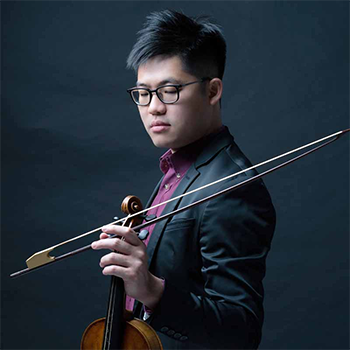by Daniel Hathaway
Tonight at 7, the Baldwin Wallace FOCUS Festival will shine a light on the compositions of Omar Thomas, while Local #4 Music Fund will present “Dynamic Deviations: Works Featuring Living and Underrepresented Composers at Convivium 33 Gallery.
Tonight at 7:30, two British guests — composer and conductor George Benjamin and countertenor Tim Mead — will join The Cleveland Orchestra and Chorus in Benjamin’s Dream of the Song, and Apollo’s Fire concertmaster Alan Choo (pictured) will solo in “Sacred Mysteries: Biber’s Rosary Sonatas for Violin” in Rocky River (the first of four concerts). Read our previews of the Benjamin here, and of the Biber here.
At the same hour, Jonathon Turner and Emorja Roberson, voice & Rylan Harris, voice/piano will perform music by Florence Price, Margaret Bonds, Leslie Adams, Three Mo’ Tenors, and William T. Burleigh at CIM, and The Oberlin Trio, pianist Haewon Song, violinist David Bowlin, and cellist Dmitry Kouzov will give a faculty concert in Kulas Recital Hall.
INTERESTING READS:
Dance Magazine interviews Cleveland Ballet’s new artistic director Timour Bourtasenkov about his plans to reset the 9-year-old company after “a series of recent scandals.” Read the conversation here.
Bob Abelman, former theater critic for the Austin Chronicle, comments on the “Declining State of the Art of Arts Journalism” in The Arts Fuse, with special reference to the Cleveland Plain Dealer. Read the article here.
And in the Columbia Journalism Review, Feven Merid interviews Israel Daramola on the challenge facing music journalism after the recent decision by Condé Nast to downsize Pitchfork and incorporate the publication into the men’s fashion magazine GQ. “It is hard not to see this development as a true indicator that we’re nearing the endpoint of robust, meaningful music criticism as a concept.” Read the interview here.
TODAY’S ALMANAC:
In an unusual coincidence, early German composer Michael Praetorius departed this life in Wolfenbuttel on February 15, 1621, the same date on which he was born in Creuzberg an der Werra in 1571.
Other observances today: the birth in 1797 of German piano craftsman Heinrich Engelhard Steinweg (which translates as “Steinway”), the departure in 1885 of German conductor, composer and violinist Leopold Damrosch in New York (the friend of Liszt and Wagner, who founded the New York Symphony (now the Philharmonic) and led early Wagner performances at the MET Opera, and the births in 1905 and 1907, respectively, of American song composer Harold Arlen (in Buffalo, né Hyman Arluck, author of “Somewhere Over the Rainbow”) and French composer and organist Jean Langlais in La Fontenelle.
by Jarrett Hoffman:
And on February 15, 1947, American composer John Adams was born in Worcester, MA.
There are of course many ways to celebrate this distinguished musician. You could choose the piece for which he won the 2003 Pulitzer Prize in music: On the Transmigration of Souls, written in remembrance of the 9/11 terrorist attacks. You could also follow local roots and revisit his Short Ride in a Fast Machine and his violin concerto Scheherazade.2, as well as his Must the Devil Have All the Good Tunes? which he conducted during a set of appearances with The Cleveland Orchestra in 2018 and 2022. (Watch a rehearsal clip of the latter here.)
But with Presidents Day approaching on February 19, what could be more fitting than Nixon in China? That work received mixed reviews after its premiere in 1987 but has since been recognized as a landmark American opera.
Opera is of course an audiovisual medium, and fortunately, there are several clips on YouTube from the work’s Metropolitan Opera debut in 2011. Here’s one famous excerpt, “I am the wife of Mao Tse-tung,” which receives a standout performance — both emotionally intense and technically virtuosic — by soprano Kathleen Kim.
Other musical anniversaries to commemorate today include the birth of another important American composer, the late Christopher Rouse in 1949, and several deaths (composer and arts administrator William Schuman, 1992, and Russian composer Mikhail Glinka, 1887).




